Composer, critic, concert Manager; pianist, publisher, entrepreneur; Professor, mother, wife: 200 years after her birth, Clara Schumann, as a power woman of the 19th century. Century recognized.
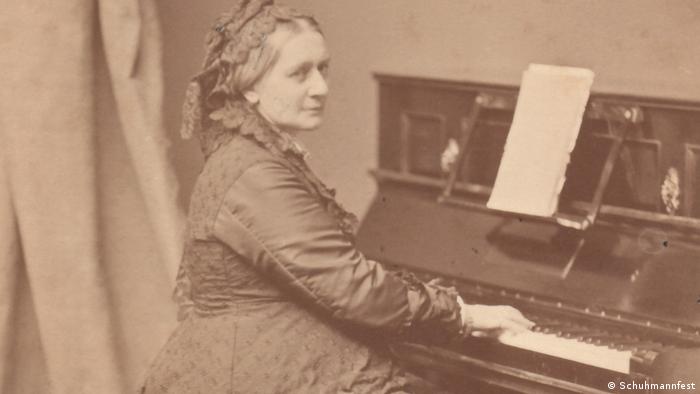
In the anniversary year of Clara Schumann, there are far and wide special concerts and exhibitions, the latter for instance in Zwickau, Frankfurt am Main, Bonn and Leipzig. Alone in her native city of Leipzig in 2019, held 170 events on the subject of new biographies, and Youth diaries are published. Also, the compositions of Clara Schumann, who were so long ignored, are currently in not a few concert programmes.
The broader – though perhaps not quite-so-young audience as “the woman on the 100-Mark bill” of 1990, known. But Clara Schumann was more than that – in the world of music, she was such an influential figure that you Look up today live in concert can be felt.
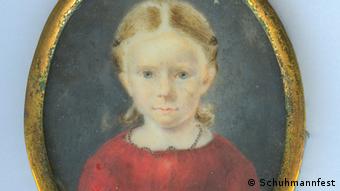
The young girl becomes self-aware
Stormy game, restrained essence of
This remarkable personality was on 13. September 1819 born in Leipzig, Clara Wieck. Her divorced father, Friedrich Wieck, was a well-known piano teacher and founder of a piano factory. Already from the age of five, Clara received from him piano lessons, according to his own method. He left them in the composition to teach, learn foreign languages and also physical exercise was part of the education program.
Already at the age of nine, Clara made her first public appearance as a pianist at the Leipzig Gewandhaus. Soon after, published, Friedrich Wieck, Opus 1, his daughter: Four polonaises.
Father and daughter were soon on extended concert tours – both in Germany and abroad. The often two – to three-month trips in the Coach were arduous, and often the piano was taken.
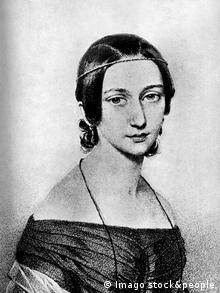
From a lithograph of the motif for the 100-Mark note was
Contemporaries described Clara Wieck’s game as fast-paced and spirited. “The girl has more power than six boys together,” wrote Johann Wolfgang von Goethe after a concert in Weimar. In personal experience the opposite picture emerged, however: Felix Mendelssohn Bartholdy saw you as shy and quiet, and after a meeting in 1838, described by Franz Liszt as “a very simple Person, very good, Flirty, educated, by no means, in their art, ascendant, but the noble art.”
Celebrities, acquaintances, and first love
During a trip to Vienna as a 19-Year-old described the Emperor Ferdinand I. as the “miracle girl”. It’s impressive concert must have been programs that also included their own works. This includes the piano Concerto in a minor, full of tonal cascades and daring leaps, the Clara Wieck on 09.11.1835 belonged as a 16-Year-old premiered. The German pianist Ragna Schirmer, who performed at the Clara-Schumann-anniversary year of their original programs, admitted in an Interview, to be after the concert, “” exhausted been.
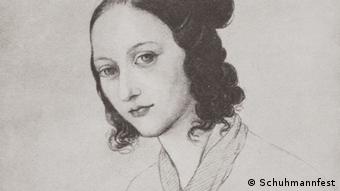
Clara Schumann play today to return a pianist “exhausted”
Liszt, Mendelssohn, Goethe, but also Paganini and Chopin knew the young musician. And Robert Schumann, whom she met nine and a half years for the first time know. The then 19-year-old law student lived for a year in the home of Wieck, the famous piano teacher instructed. From an intimate friendship and love developed. Clara was 16 at the time. As Friedrich Wieck learned of this, he forbade any contact between the two. The father organized concert tours, drove and monitored his daughter day and night.
The secret engagement in August, 1837, and was followed by a legal action brought by the fiance in July 1839. A year later, the court approved the marriage, on 12. September, 1840, was held.
Civil wife and acclaimed pianist
First of all, Robert Schumann wanted his wife to abandon her concert career. You should perceive in the first line of their civic duties as a wife. Soon they emerged: The first concert as Clara Schumann, followed in the autumn of 1840. “My art will not let me, I’d have to make eternal accusations,” she wrote.
Clara: the internationally acclaimed pianist, Robert: the little-known composer. Nevertheless, both spouses are found to be composing about her piano playing. Because Robert peace needed to compose, had Clara to restrict your Practice strong. Your primary desire was, “that Robert can be quite a life in music and his pleasure that no more worry clouding his beautiful artist’s life.”
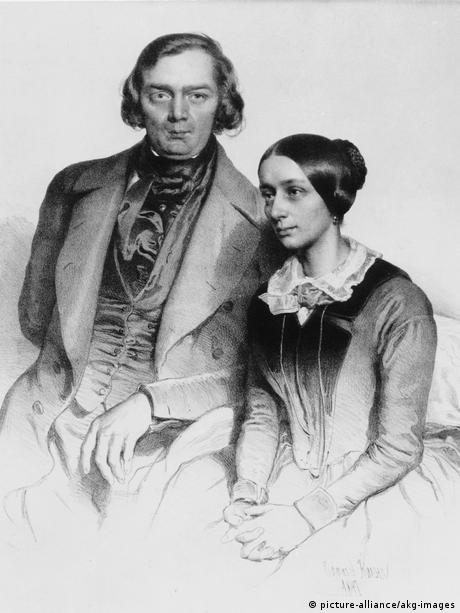
Artistically fruitful years of marriage
Soon, the civil marriage has been broken, which is Ideal due to financial constraints, which led to the Comeback of the concert pianist. In spite of ten pregnancies Clara appeared in 14 common years of marriage, at least 139 Times, even on trips abroad: to the North of Germany (1842), Russia (1844), Vienna (1846) and the Netherlands (1853). Often the couple together, travelled, and even if Robert could not bear to stand in the shadow of his famous wife. However, there were also concerts that included his works, and him in this way, internationally known made.
The marriage seems to be happy and artistically fruitful been. The partners exchanged musical ideas, Robert has supported the creative side of his wife in a sustainable way. In contrast, the then social attitude towards women seems to Clara to have internalized: it was compose of men’s work. Even after the piano trio, in 1845, considered to be their most successful composition, she wrote: “of Course it is always the woman work, which is always missing in the force, and here and there in invention.”
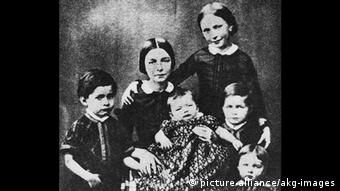
Group picture of the children of Robert and Clara Schumann, Ludwig, Marie, Felix, Elise, Ferdinand, Eugenie (photo from the year 1855)
Disease and a Widow
Clara Schumann’s half-brother, Woldemar Bargiel, who visited the couple in July and August, 1852, reported the frequency of disease-Roberts, which took his worried wife very. On Bargiel it seemed so, “as if Schumann and Clara had one and the same physical organism, and every sensation of Schumann in you both.”
Already since his youth, Robert Schumann had suffered from depression and mood swings. Today we would refer to his condition as bipolar disorder. Already during the first years of marriage in Leipzig, then from 1844 in Dresden and, in 1850, in Düsseldorf phases of the Disease and nervous alternated collapses with a happier phase.
In the case of a suicide attempt on carnival Monday in 1854, Robert Schumann, plagued by hallucinations, plunged, in the river Rhine. He was rescued by fishermen and in a mental institution in Endenich, near Bonn, admitted to the hospital. On the instructions of the Doctors, his wife was allowed to visit him until two days before his death on the 29. July 1856 reunion.
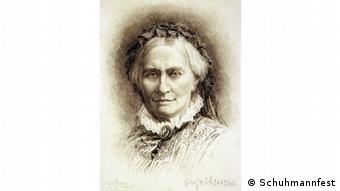
The Grand Dame of the music
The 37-Year-old that occurred from this Moment on for the Rest of your life only in Black, had to change her life completely. The children in boarding schools, friends and family members housed, was Clara Schumann, once again, on concert tours – in the years 1863-73 alone 19 Times for England.
Clara’s traces in today’s concert life
Sustainable support for Clara Johannes Brahms, who had met the couple as a 20-Year-old – a year before Robert Schumann’s death – was. Between Brahms and Schumann, an intimate love, the employees of the posterity soon developed: the letters of the two were destroyed by mutual agreement. Is the correspondence of Clara Schumann, proves Brahms best counselor and give him a fascinating insight into the composer’s craft is.
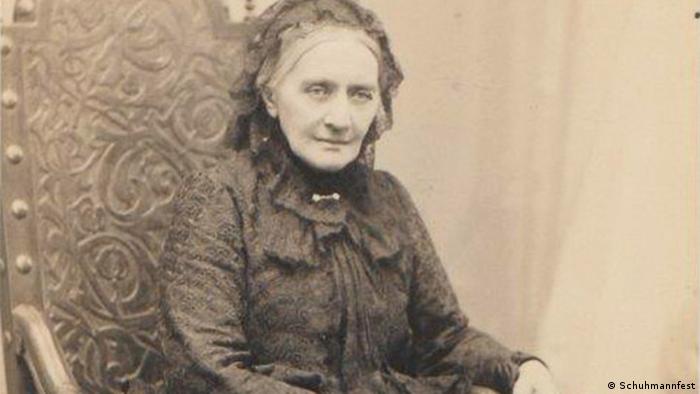
Infamous teaching of “tears and sighs Allee”
After years in Baden-Baden and Berlin Schumann, in 1787, has been called the “First piano teacher,” at Dr. Hoch’s Conservatory occupations in Frankfurt am Main. Madame Schumann had the privilege of teaching at home in her apartment in Frankfurt mylius road. Among their students, they soon became “tears and sighs alley” – the Grand Dame of the music was notorious for its devastating criticism. Their daughters, Clara Schumann were in your class a support. With the sons she had to the blows of fate suffered by: A son was mentally retarded and lived to a mental hospital, another suffered from schizophrenia, a third was an opium addict.
Their concert programs of Clara Schumann’s education reflected an ideal: to glory by way of entertaining smaller bravura pieces towards the whole works and cycles of Works by Beethoven, Brahms, Chopin, Mendelssohn, Schubert, and Bach – and of course Schumann, whose posthumous promoted tirelessly.
As the most important pianist of the 19th century. Century, Clara Schumann contributed to the emergence of a modern piano repertoire. She worked as the editor of the complete works of her husband, and adapted to the songs, which Schumann had dedicated to her, for the piano. Just one you made after his death, almost never go back to: compose.